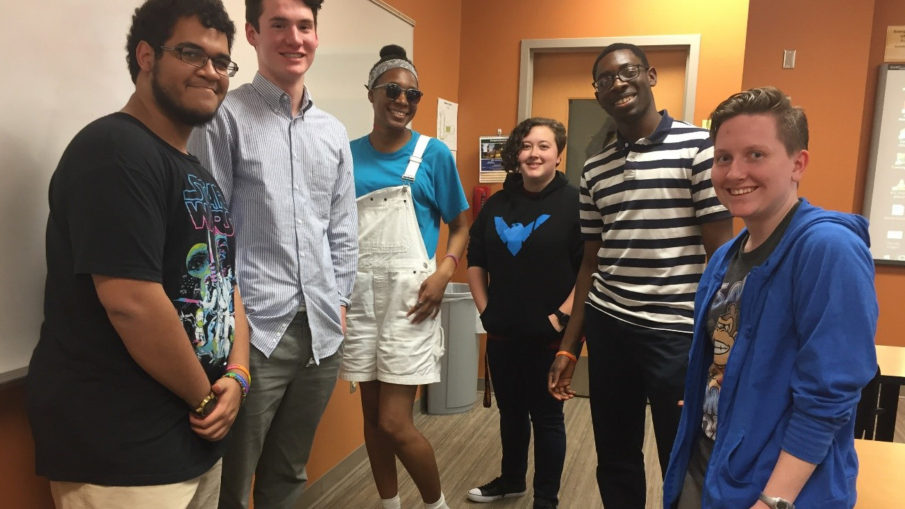Student members of FCC’s Gender Sexuality Alliance (GSA) club voiced concern at a February meeting regarding the recent shift in U.S. government ideology and policy.
On Feb. 22, the Trump administration rescinded federal Title IX guidance regarding bathroom accessibility for transgender public school students. The move signals evidence of an administration aiming to hold states’ rights above civil rights.
“States will take it upon themselves to ignore the needs and rights of our community,” said Lance Nightingale, 24, a transgender GSA member, who commented on the recent move regarding Title IX. “As a person who is pre-medical transitioning, any laws regarding transgender people and bathroom use puts me in a harder spot than I was already in. Having the law back them up gives [states] more power which in turn lessens my power within my own identity.”
Nightingale said that while he’s encountered harassment at past jobs, his experience as a student at FCC has mostly been a positive one.
“Overall most people [at FCC] are respectful,” he said.
Freshman Dereck Myers, president of FCC’s GSA club says that members are thankful for the GSA and its role as a support network for LGBT students.
“The GSA is a safe space for LGBT students and allies,” Myers said.
Currently the club supports 12 LGBT members and meets twice a week on Wednesdays and Thursdays.
The GSA offers social and support services not only to students, but to LGBT faculty, staff and to heterosexual allies as well. And although, as Myers says, discussing politics isn’t typically a topic within the club, when asked how they feel in America’s changing political climate, many of the 10 members in attendance echoed the same emotion: Fear.
Commenting on Marriage Equality, GSA members expressed trepidation about the open Supreme Court seat. Rebecca Wine, 19, said she worries if her right to marry whomever she loves might be challenged in the future.
In a landmark decision in June 2015, the Supreme Court made marriage equality across state lines a civil right, and a Gallup survey suggested that 123,000 same-sex couples were married within the year following the ruling. But with the federal government signaling a right-leaning shift, LGBT and minority communities wonder if the constitutional system of checks and balances will continue to protect them.
“This is about me,” Prince Mills, 19, said. “I’m gay and a black man. I’m very scared.”
Mills, who described his coming-out story as difficult and a bit “messy,” noted how the daily challenges facing the LGBT community are often more personal than they are political. Members told how family and friends aren’t always accepting and supportive. And with the recent Title IX change, public schools have the power to deny bathroom protections for transgender students, a decision that students fear could add to the negative physical and emotional effects experienced by LGBT youth.
The Centers for Disease Control and Prevention compiles research regarding the impacts of bullying on LGBT youth, and reports striking disparities compared to their heterosexual peers. Their findings show that LGBT youth are more likely to report high levels of bullying and substance use, and more than twice as likely to attempt suicide.
Offering guidance, the CDC recommends that schools create a safe and supportive learning environment for all students, including student-led and student-organized gay-straight alliance clubs, like the GSA, that promote acceptance.
“Almost every high school in Frederick County has a GSA,” Myers said, who is working towards increasing coordination between FCC’s GSA and local high schools in Frederick.
Beyond finding groups like the GSA, members also spoke about less-known role models they look to for support, and how allies can help.
Lexi Blackmon, 19, said that watching non-binary trans YouTuber, Miles Chronicles, helped her come to terms with her own identity. And fellow member Nightingale also spoke of another YouTuber, Chase Ross, a sociologist and trans-man, who talks about sex positivity and how to navigate the world on an individual level.
“The internet is a good place to look for resources because you are free to explore identities and talk to people that identify a different way while you’re trying to figure yourself out,” Nightingale said. “And allies can do things [like help others to understand gender], and little everyday things that make people feel comfortable too.”
Mills agreed.
“Even seeing cars sporting Human Rights Campaign stickers makes a big difference and means a lot,” he said.
Commenting on the role of LGBT allies, GSA president Myers said a passionate ally is someone who tries their hardest in all facets of the community, while volunteering their time when they can afford it.
“Allies are very useful,” he said. “It’s nice having allies in the club that actually want to be here.”
For a complete list of school policies and practices recommended by the Centers for Disease Control and Prevention to help promote health and safety among LGBTQ youth, visit https://www.cdc.gov/lgbthealth/youth.htm
If you or someone you know needs local support or help, The Frederick Center located in downtown Frederick serves the LGBT community and its allies. Visit their website at www.thefrederickcenter.org.
To support the LGBT community, become a member of the Human Rights Campaign at http://www.hrc.org
For emergency/crisis help:
National Suicide Prevention Hotline: (toll free) 800-273-8255
Crisis Text Line: 24/7 text, trained counselors, free (data rates may, but not usually, apply): text 741741
LGBT National Help Center: (toll free) 1-888-843-4564
LGBT National Youth Hotline: (toll free) 1-800-246-PRIDE

